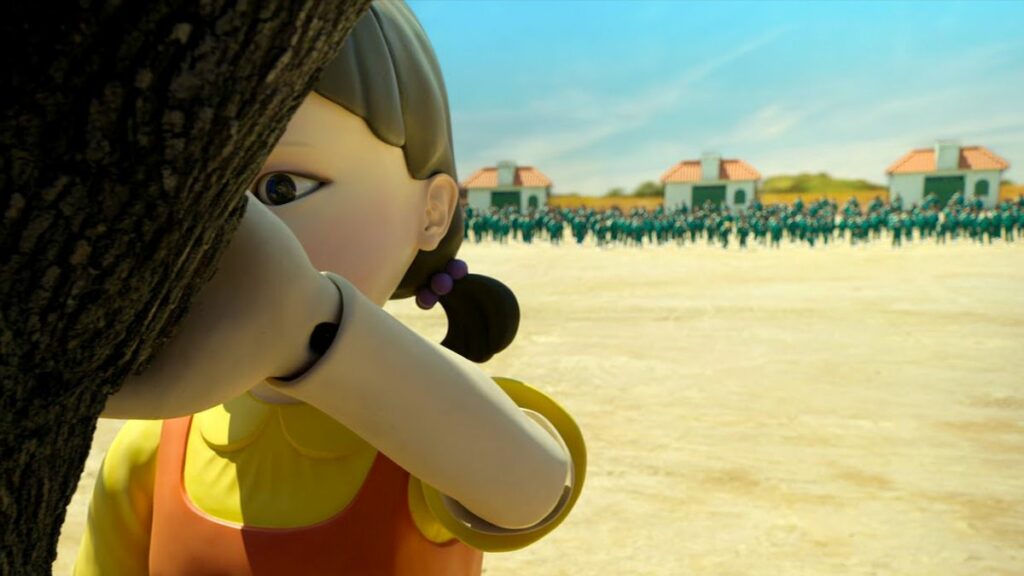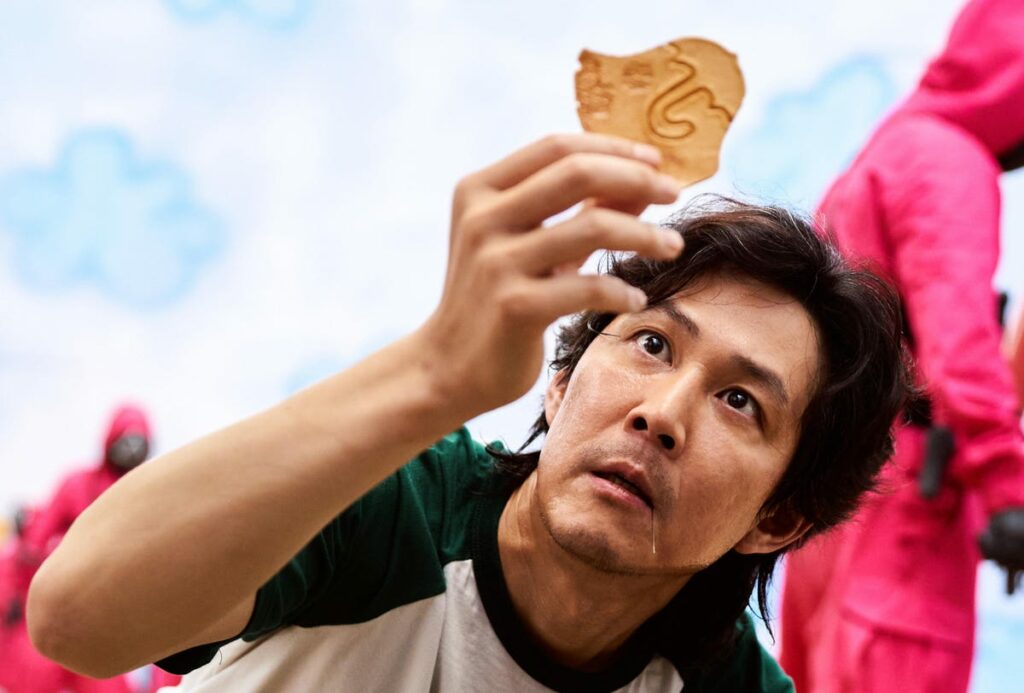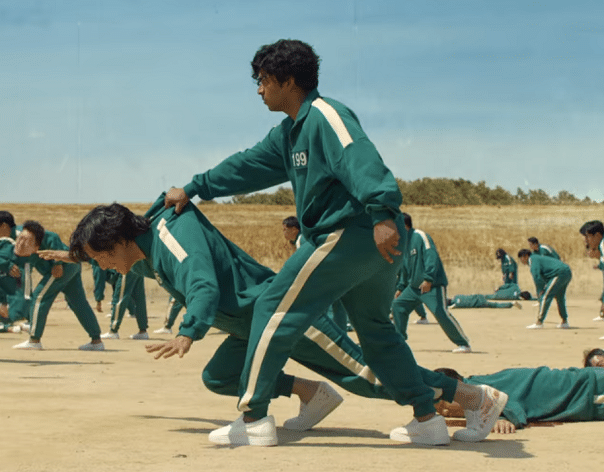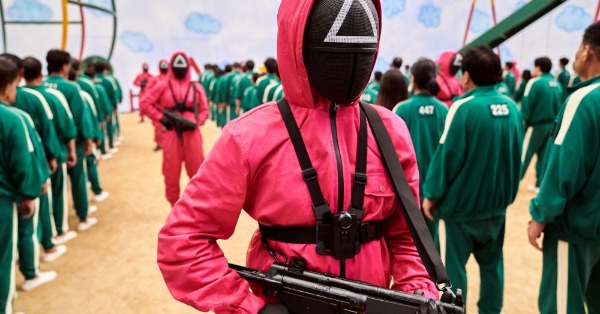Review — Squid Game; web series
Cast — Lee Jung-jae, Park Hae-soo, Wi Ha-joon, Jung Ho-yeon, Anupam Tripathi
Director — Hwang Dong-hyuk
Of all the uncanny images in Squid Game, the most terrifying one is that of a giant-sized playground doll, a girl doll. The doll sings a children’s rhyme that accompanies the move-or-freeze game ‘Red Light, Green Light’ in a mechanical singsong. As the clock ticks and the game speeds up, the consequences of losing in a mere playground game unfold on a barren field in the middle of a Pacific island. The horror intensifies with that particular song, speeding up every minute, in that robotic, unnerving, distressingly un-human voice.
What happens if you miss a step, either to move or freeze?
You die.
About 20 minutes into the very first episode of Squid Game, the juxtaposition of violent death with simple children’s games establishes the premise of remorseless terror. Yes, there have been obvious comparisons to The Hunger Games series of films, given how both stories essentially present the spectacle of death being relished in a public arena; a well-established metaphor for our modern-day, obsessive voyeurism. But hunting is adult entertainment. On the other hand, introducing bullets in a game of marbles can lead to seriously disturbing results.

If you can stomach this premise – and those debut deaths – Squid Game unfolds as a parable on the larger human condition, while masquerading as a tightly-knit thriller. With just the right amount of gore thrown in, the show – released barely a month back, on September 17, 2021 – has shot to Netflix’s No. 1 spot globally, drawing 111 million viewers in the past four weeks, and is now poised to become the OTT platform’s most-watched series ever.
What is the reason for the Squid Game craze? It has a fascinating plot: a bunch of losers are given one last chance to improve their lot in life, by participating in a series of children’s games, all for a prize money of 46 billion South Korean won (about $39 million). The small print? If you lose, you are literally eliminated — dead, that is. As the games progress, VIP guests are brought in to watch the event live, sipping on cognac, betting on contestants to survive the round, or die. Unlike The Hunger Games’ futuristic dystopia, all of this takes place in present-day Seoul, with its abysmal class and economic divide framing the backdrop to the drama.
The plot traces the life arc of debt-ridden gambling addict Seong Gi-hun (played brilliantly by Lee Jung-jae), introduced as the primary protagonist. Down on his luck, after losing a large sum of money, he comes across a nattily-dressed, anonymous salesman (a brilliant cameo by Gong Yoo, of Train To Busan fame) in a subway station, who challenges him to play a game of ddakji, where two players try to flip each other’s cards. After losing for a long spell – where he gets continually slapped on the face as reward for the winner – Gi-hun wins a considerable sum of money. The salesman hands him a strange business card, telling him that there is much more to be won, if he agrees to participate in games with much higher stakes. Gi-hun accepts, after some deliberation. The die is cast.

A mysterious car and ferry ride later, the ‘participants’, all 456 of them, to be exact, discover themselves in a large dormitory, wearing numbered, identical tracksuits, chaperoned by gun-toting, masked soldiers. Gi-hun is the last one, being referred to as Player 456. He is surprised to find that his childhood friend and neighbourhood prodigy Cho Sang-woo, now a failed banker on the run, is Player 218. The circle is completed by a frail old man, who is Player 1, a young, orphaned North Korean defector named Kang Sae-byeok (Player 067) and Ali Abdul (portrayed sensitively by Indian origin actor Anupam Tripathi), a Pakistani illegal immigrant who worked in a sweatshop and attacked his owner. Then, there is a subplot of a police inspector who follows one of the pick-ups and reaches the island, in search of his lost brother, and discovers a human organ-smuggling racket operating within the game circle – selling body parts from the players’ corpses.

The drama in Squid Game revolves around the bonding, the subsequent deception, the little victories and terrifying losses that take place in the interactions between these people and their immediate outer periphery, cooped up in that nameless, faceless ocean island. A single winner is to emerge, out of 456 players, through a ruthless process of elimination in six rounds of games, the last one being ‘Squid Game’. Obviously, betrayal forms a key element in taking the story forward. At its most intense, situations force the true persona of each ‘named’ character; good, bad or just plain ugly. Right after the first game, the dorm turns into a bloody battlefield at lights out, where the weak are weeded out and beaten to death by stronger participants in a free-for-all. Rejecting his old friend in an instinct to survive a game of marbles, Cho Sang-woo partners up with Ali for the game of marbles, only to sorely cheat the very partner he chose. A former mob boss pushes away a part-time lover, who is killed because she cannot convince anyone to partner up. It is a loser dies situation, after all.

Yes, Squid Game is violent. But even violence/horror in South Asian cinema does not follow your everyday Hollywood trope. Squid Game, in a manner unique to the legacy of the very best of South Korean cinema – think Park Chan-wook’s The Vengeance Trilogy, Yeong Sang-ho’s Train To Busan or even Kim Ki-duk’s enigmatic The Isle – is best discovered in layers, and terrible death is only one aspect of it all. Which is why the ‘thriller’ or ‘horror’ tag is not enough. Not one to shy away from controversy, series director Hwang Dong-hyuk (best known before Squid Game for his 2011 film The Crucible, the story of sexual abuse of deaf children in Gwangju, South Korea; a film that sparked public outcry and brought about changes for sex crimes in the country) brings in cold-blooded killings to emphasise the instinct of survival that carries the plot. Each round of games, resulting in either life or gory death, seems to ask questions, and one of the pivotal questions, raised at the end of the series, is ‘why’? Why did the games take place, mercilessly violent as they were? What is the point of the whole exercise, after all? The inconceivable, almost brutal answer, from the zillionaire maker of the whole melee, is ‘because we had nothing else to do’— because ‘someone with no money and someone with too much money’ do not know how to go on.
Squid Game, thus, is not pure ‘entertainment’, per se, but an interpretation of the philosophy of greed; on man’s inherent selfishness and innate sacrifice. It is life seen through the lens of playground politics; naked, animal, frequently despondent, but not entirely sans redemption. That is exactly the reason why the whole world seems to be watching.






